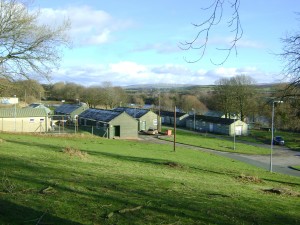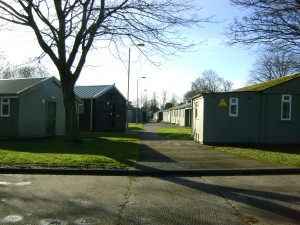Hello, my name is Jimmy Evans and I am the Training Safety Officer (TSO) and Commandant for Halton Training Camp near Lancaster, Holcombe Moor Training Area near Bury, and the Ambleside Adventure Training Hut in the Lake District National Park.

About Halton
Halton is a small but busy training camp of 47 acres which was acquired for military training in 1938. Initially it was used primarily as a Royal Engineer Amphibious Bridging Camp - it is still known as ‘Halton Bridging Camp’ by older locals – but today it is a general purpose all-year-round camp. It has a small training area catering for regular and reserve forces of all arms and for cadet organisations.

Storm Desmond - The Arrival and Departure of an Unwelcome Guest
Storm Desmond hit Cumbria and Lancashire during December and caused significant flooding and damage to the countryside, people’s homes and businesses throughout the north. Lancaster was badly hit with parts of the low-lying city suffering floods, and a complete loss of power and communications for up to three days. Halton Training Camp suffered significant flood damage along its riverside banks resulting in major structural damage to our 25 metre shooting range; buildings along the river line were completely flooded as the River Lune burst its banks.
![Flooding at Halton's 25m range. [Crown Copyright]](https://insideDIO.blog.gov.uk/wp-content/uploads/sites/29/2016/02/25m-range-flooded-Dec-2015-300x225.jpg)
One of our lodger units, the Infantry Training Centre (ITC) Catterick, lost many thousands pounds worth of equipment including two vehicles.
![Flooding at ITC Catterick's stores. [Crown Copyright]](https://insideDIO.blog.gov.uk/wp-content/uploads/sites/29/2016/02/ITC-Catterick-stores-flooded-300x225.jpg)
![CCAT's classrooms were displaced by the flooding. [Crown Copyright]](https://insideDIO.blog.gov.uk/wp-content/uploads/sites/29/2016/02/CCAT-classrooms-displaced-300x225.jpg)
What happens when adversity strikes?
The small team here at Halton rapidly got to grips with the challenge of the post-flood clean up with everyone pulling together. The first priority was to make the camp and training area safe, and then to start the clean-up. This operation was a multi-team effort, led by DIO and Landmarc staff. We had much needed help from ITC Catterick who sent some soldiers to assist; CCAT who sent some cadet Instructors to help out; the local Sea Cadets, and teachers and parents from Lancaster Royal Grammar School. A special thanks must also go to Costain, the large national construction company, who are currently building a new government road link on the M6. They very kindly brought a crane off their motorway site to assist with the recovery of containers and classrooms, and they also provided us with temporary fencing to secure the security fence that had been washed away in parts.
The joint and unselfish response to the floods by so many agencies, both military and civilian, was testament to the strength of our relationships and our shared endeavour to overcome adversity.